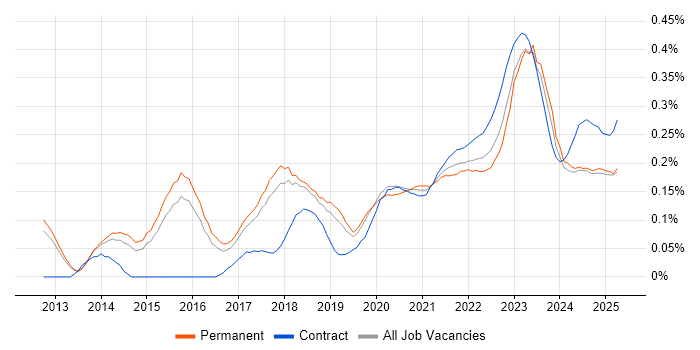ISACA Certified in Risk and Information Systems Control (CRISC)
UK > Work from Home
The table below provides summary statistics for remote or hybrid work with a requirement for CRISC qualifications. It includes a benchmarking guide to the salaries offered over the 6 months leading up to 16 May 2025, comparing them to the same period in the previous two years.
| 6 months to 16 May 2025 |
Same period 2024 | Same period 2023 | |
|---|---|---|---|
| Rank | 434 | 515 | 543 |
| Rank change year-on-year | +81 | +28 | +191 |
| Permanent jobs citing CRISC | 27 | 70 | 103 |
| As % of all permanent jobs with a WFH option | 0.15% | 0.21% | 0.25% |
| As % of the Qualifications category | 0.40% | 0.73% | 0.99% |
| Number of salaries quoted | 21 | 53 | 96 |
| 10th Percentile | £52,500 | - | £45,250 |
| 25th Percentile | £62,500 | £37,500 | £52,188 |
| Median annual salary (50th Percentile) | £75,000 | £55,000 | £70,000 |
| Median % change year-on-year | +36.36% | -21.43% | +7.69% |
| 75th Percentile | £78,750 | £83,750 | £82,500 |
| 90th Percentile | £88,750 | £93,500 | £103,750 |
| UK median annual salary | £75,000 | £68,500 | £70,000 |
| % change year-on-year | +9.49% | -2.14% | - |
All Academic and Professional Certifications
Work from Home
CRISC falls under the Academic Qualifications and Professional Certifications category. For comparison with the information above, the following table provides summary statistics for all permanent job vacancies with remote or hybrid options requiring academic qualifications or professional certifications.
| Permanent vacancies requiring academic qualifications or professional certifications | 6,704 | 9,526 | 10,381 |
| As % of all permanent jobs with a WFH option | 36.61% | 28.24% | 25.51% |
| Number of salaries quoted | 3,120 | 5,895 | 6,319 |
| 10th Percentile | £31,250 | £32,500 | £35,000 |
| 25th Percentile | £47,500 | £42,500 | £45,000 |
| Median annual salary (50th Percentile) | £55,000 | £57,000 | £60,000 |
| Median % change year-on-year | -3.51% | -5.00% | - |
| 75th Percentile | £70,600 | £72,500 | £77,715 |
| 90th Percentile | £83,750 | £87,500 | £95,000 |
| UK median annual salary | £55,000 | £54,000 | £59,600 |
| % change year-on-year | +1.85% | -9.40% | +8.36% |
CRISC
Trend for Jobs with a WFH Option
Job vacancies with remote working options citing CRISC as a proportion of all IT jobs advertised.

CRISC
Salary Trend for Jobs with a WFH Option
3-month moving average salary quoted in job vacancies with remote working options citing CRISC.
CRISC
Salary Histogram for Jobs with a WFH Option
Salary distribution for jobs with remote working options citing CRISC over the 6 months to 16 May 2025.
CRISC
Co-occurring Skills and Capabilities with WFH Options by Category
The follow tables expand on the table above by listing co-occurrences grouped by category. The same employment type, locality and period is covered with up to 20 co-occurrences shown in each of the following categories:
